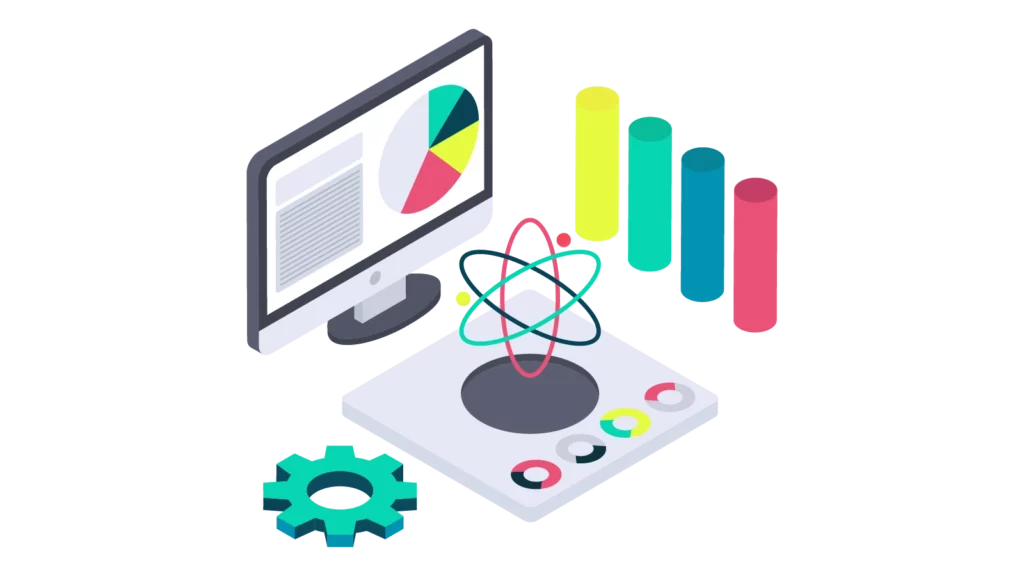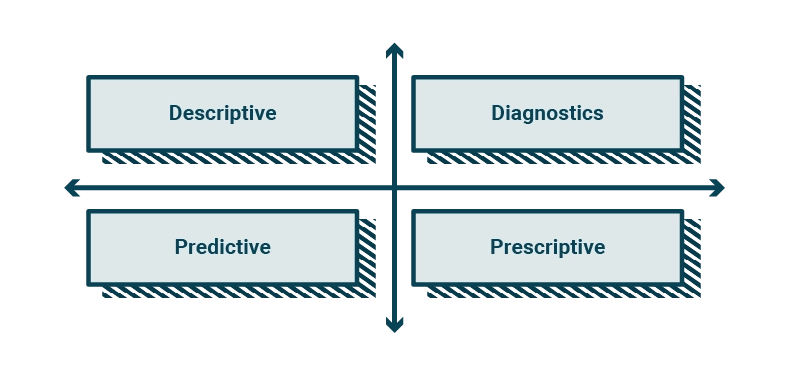The history of Data Science is a continuum of innovation and discovery, fueled by the increasing amount of data and evolving information technologies.
The future of Data Science looks even more promising, with the potential to further revolutionize the way we understand the world and make data-driven decisions.
Data Science, or data science, has emerged as an interdisciplinary field that combines mathematical, statistical, computer and visualization skills to extract meaningful information from data.
Its roots can be traced back to the 20th century, when mechanical computation and statistical analysis began to play an increasingly important role in the social sciences and the field of scientific research. However, it was with the advent of computers and the huge increase in the amount of data available that Data Science began to flourish.
In the 1960s and 1970s, computer scientists developed algorithms and techniques for data analysis, paving the way for the birth of the concept of "data mining." In the 1980s, advances in computer technology made large-scale data processing possible, ushering in the era of "Big Data."

However, it has only been in recent decades that Data Science has reached its full potential. With the advent of the Internet and the explosion of social media and digital platforms, the enormous amount of data generated daily (Big Data) has created new challenges and opportunities for data scientists.
Today, Data Science plays a crucial role in many sectors, including marketing, healthcare, finance, industry, and many others. Through data analysis, valuable insights can be gained that guide informed decision making and enable the identification of hidden patterns, trends and anomalies within the data itself.
The application of Data Science has become so pervasive that many consider this discipline to be the "oil of the 21st century," as data have become an invaluable resource.
The use of advanced algorithms, machine learning and artificial intelligence has led to further developments in Data Science, opening up new perspectives and challenges in today's world.
The advent of Big Data has revolutionized the modern concept of Data Science, highlighting the importance of extracting business value through the analysis of large amounts of information. Data Science combines scientific skills, such as statistics, mathematics, and computer science, with managerial skills, focusing on the strategic use of data.
Data science can be applied to different areas of expertise (from Finance to Marketing to Production).
We distinguish its mode of application into 4 categories:

The ultimate goal of Data Science is to obtain useful information to achieve business objectives by expanding knowledge about certain phenomena and answering complex questions or problems.
For example, Data Science can offer solutions to optimize processes, acquire new customers by meeting their needs, increase sales through the development of innovative products and services, and create new business models to generate additional profits.
In summary, Data Science aims to make evident the information hidden within the many available data in order to contribute to business competitiveness and provide valuable insights.
Through the accurate analysis of data, Data Science offers a competitive advantage that can make a difference in business and is a pillar of Digital Transformation.

Digital and beyond: how Artificial Intelligence can transform your business. The latest trends in using AI for business innovation. Discover the benefits of AI, innovative AI-based business models, and best practices for implementing AI and leading your company into the digital future.
Descriptive analysis is applicable in a variety of fields, offering a wide range of possibilities for extracting meaningful information from data and improving understanding of business dynamics.
In the area of marketing, descriptive analytics may involve analysis of social media interactions, analysis of customer data for better market segmentation, and analysis of consumer buying patterns.
In the field of operations, descriptive analysis can cover production process performance analysis, production time and cost analysis, and demand and resource utilization analysis.
In health care, descriptive analysis may include analysis of epidemiological data, analysis of waiting times in health care services, and analysis of patient data for disease prevention and management.
In the financial context, descriptive analysis may involve financial transaction analysis, financial market data analysis, and customer data analysis for profiling and personalization of financial services.
| Descriptive | Use case 1 | Use case 2 | Use case 3 |
| Marketing | Analysis of monthly sales by product | Customer analysis by segmentation | Consumer buying patterns |
| Operations | Performance analysis of production processes | Production time and cost analysis | Analysis of demand and resource utilization |
| Healthcare | Analysis of epidemiological data | Analysis of waiting times in health services | Analysis of patient data for prevention |
| Finance | Analysis of financial transactions | Analysis of financial market data | Analysis of customer data for profiling |
Data Science diagnostics can be applied in various areas to identify the causes of certain problems or anomalies, enabling corrective measures to be taken and overall performance to be improved.
In the field of marketing, diagnostic data science can be used to analyze advertising campaigns in order to identify factors that influence online conversions or identify the causes of decreased conversions.
In operations, diagnostic data science can help analyze inefficiencies in the supply chain, identify causes of production delays or identify anomalies in supplier performance.
In the health care sector, diagnostic data science can be applied to identify the causes of high remission rates, analyze the reasons for medical errors, or search for the causes of high hospital infection rates.
In the financial context, diagnostic data science can be used to identify the causes of losses in a portfolio, analyze the reasons for poor performance of a mutual fund, or search for the causes of anomalies in financial transactions.
| Diagnostics | Use case 1 | Use case 2 | Use case 3 |
| Marketing | Analysis of advertising campaigns | Researching the causes of decreased online conversions | Identification of factors influencing retention |
| Operations | Analysis of inefficiencies in the supply chain | Detection of causes of production delays | Detection of anomalies in supplier performance |
| Healthcare | Identification of causes of high remission rates | Analysis of the reasons for a frequency of medical errors | Researching the causes of high hospital infection rates |
| Finance | Identification of causes of losses in the portfolio | Analysis of reasons for poor performance of a mutual fund | Searching for causes of anomalies in financial transactions |
Predictive data science can be applied across sectors, providing predictions and perspectives that support strategic planning and informed decision making.
In the marketing industry, predictive data science can be used to predict online user behavior, anticipate future sales of a product, and predict customer churn.
In the field of operations, predictive data science can help predict product demand, estimate customer wait times in queues, and detect anomalies in operational activities.
In health care, predictive data science can be used to predict patients' risk of hospitalization, predict rehospitalization rates, and monitor epidemic trends.
In the financial context, predictive data science can be used to predict stock prices, anticipate market fluctuations and estimate interest rates.
| Predictive | Use case 1 | Use case 2 | Use case 3 |
| Marketing | Predicting online user behavior | Prediction of future sales of a product | Predicting the abandonment (churn) of customers |
| Operations | Forecasting demand for products | Prediction of customer waiting times in queues | Prediction of anomalies in operational activities |
| Healthcare | Predicting patients' risk of hospitalization | Prediction of rehospitalization rates | Forecasting epidemic trends |
| Finance | Stock price forecast | Prediction of market fluctuations | Forecasting interest rates |
Prescriptive Data Science can provide valuable insights and targeted suggestions in the areas of marketing, operations, healthcare, and finance, helping to make strategic decisions and optimize results.
In the marketing sector, Prescriptive Data Science can be used to optimize advertising campaigns, provide personalized suggestions for customer targeting, and optimize product pricing.
In the field of operations, Prescriptive Data Science can optimize delivery routes, offer suggestions for resource allocation, and optimized production planning.
In healthcare, Prescriptive Data Science can help optimize personalized medical care, provide suggestions for workload management, and identify risk behaviors in patients.
In the financial context, Prescriptive Data Science can optimize investment portfolios, provide suggestions for risk management, and personalize financial product offerings.
| Prescriptive | Use case 1 | Use case 2 | Use case 3 |
| Marketing | Optimization of advertising campaigns | Customized targeting suggestions | Optimization of product pricing |
| Operations | Optimization of delivery routes | Suggestions for resource allocation | Optimized production planning |
| Healthcare | Optimization of personalized medical care | Tips for workload management | Identification of risk behaviors |
| Finance | Optimization of investment portfolios | Tips for risk management | Personalization of financial product offerings |
The skills required for Data Science are a mix of technical, analytical, and business skills. A successful professional in this field must be able to manage Big Data, develop statistical-mathematical models, use machine learning techniques, programming and data presentation, and understand business processes and industry dynamics.
The skills required therefore, are extremely diverse and cover a wide range of fields.
It is essential to have a solid knowledge base in data management to properly manage the Big Data needed for analysis. This involves the ability to capture, store and organize large amounts of data efficiently and securely.
In addition, it is crucial to have mastery in developing statistical-mathematical models and using analytics techniques. These skills enable the extraction of meaningful information from data, identifying patterns, correlations, and hidden trends that can provide valuable insights for making informed decisions.
The use of machine learning techniques is another key aspect of Data Science. The ability to use machine learning algorithms and models makes it possible to create predictive models and learn from data, enabling accurate predictions and automating complex processes.
Another core competency is programming. Being proficient in the major programming languages enables one to write efficient and custom code for data analysis, as well as to develop custom algorithms and automate repetitive tasks.
In addition, proficiency in using data presentation and visualization tools is essential to effectively communicate analysis results. This can include the use of specialized software and libraries to create charts, interactive dashboards, and clear and understandable visualizations.
Finally, to apply Data Science effectively, it is important to have a good understanding of business processes and industry dynamics. This allows you to understand the contexts in which you work, identify the key questions to be addressed, and translate the results of the analysis into concrete and strategic actions for the organization.
The professionals then who must work in "data science" are mainly three:
In summary, Data Science is an interdisciplinary field that combines mathematical, statistical, computer science and visualization skills to extract meaningful information from data. With the potential to revolutionize the way we make data-driven decisions, Data Science has become an invaluable resource in areas such as marketing, healthcare, and finance. Making the most of the potential of data is critical to gaining a competitive advantage and driving the digital transformation of companies.